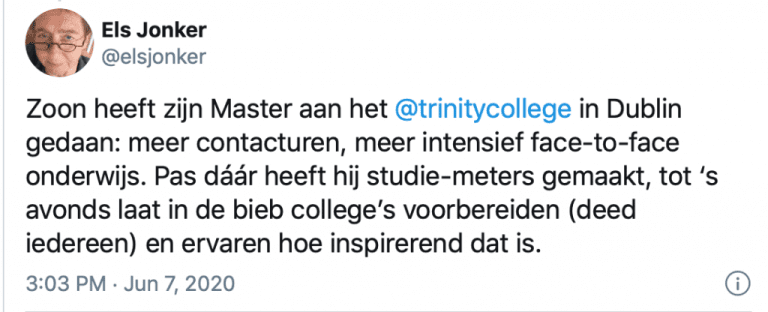Columnist Monique van der Veen dreams of real interaction with students, on campus. This is the way to retain an intellectual climate.
Monique van der Veen: “If you are concerned about polarisation at all, then assuming that ‘I am the problem’ is a very good option.” (Photo: Sam Rentmeester)
In an attempt to avoid the supermarket during Covid-19, and to avoid having to get up in the middle of the night to reserve a delivery time by the Albert Heijn supermarket, part of my solution was to order groceries through Rechtstreex.nl. Here you can order products from farmers in your region which you then collect at a set time at a set point in your neighbourhood. It attracts a certain type of consumer. Indeed, the price of that artisanal yoghurt that is so delicious it’s finger licking good, is different to the cost price of that large-scale factory produced yoghurt. If you see men here, it is usually because they are picking up their girlfriends’ orders. Such was the case of my partner. He was pleasantly surprised by a déjà-vu from his youth in the former DDR: a choice of indigenous vegetables, unwashed and still sandy, and everyone voluntarily waiting in disciplined queues.
In contrast, Albert Heijn, or any other supermarket, uses scale, streamlined logistics and mostly sells intensively produced vegetables. This, and self-service, reduces the price. This concept coupled with long opening times and a wide choice year round, is one that most consumers use greedily. This was also what the East Germans, after the wall fell, could not resist – dozens of yoghurt flavours instead of just three.
‘Education really does not scale up’
Higher education à la Albert Heijn sounds very tempting: large-scale and efficient in MOOCs, a wide choice of subject modules via the recently approved “flexstuderen” (in Dutch) system that provides students with ample choice of sets of courses they can put together themselves. The MOOCs are a wonderful way of offering education to students worldwide, and especially to students who would otherwise have little or no access to education. And part-time flexible studying makes universities more accessible to students with various life situations, such as people with families.
But what the recent period of online remote education has taught me is that education really does not scale up. The intellectual climate on campus; the spontaneous discussions among students and with teachers about the material; the collaboration of students during tutorials, classroom discussions and so on. Very little, or none, of this took place. The participation rate on online lectures was usually much lower. This parallels the MOOCs where the great majority of students drop out during the course and where retention is correlated with the degree in which people interact with other students.
‘I hope I’ll end up less exhausted as a teacher’
We were already giving lectures in halls with hundreds of students in the pre-corona days, and we switch between group and individual assignments as efficiently as we can, as proper grading and feedback are time consuming. In this sense, the Albert Heijnisation of higher education had already happened.
I dream of intensive education like this:


- Translation: Son did his Masters at the @trinitycollege in Dublin: more contact hours, more intensive face-to-face teaching. Only there he made study hours, preparing until late in the evening in the library (everyone did) and experiencing how inspiring that is.
I imagine students, encouraged by the culture on campus to prepare for lectures, and facilitated by online resources, with which we now all have experience. Such that we can go much deeper into the material during the physical meetings. Dutch politics dream of a student-free public transport facilitated by online education (in part). But to achieve this dream of education that I just sketched, we will still need to retain most of the physical lecture hours. So I have another suggestion to politicians: if you want to keep students out of public transport, you will have to invest in more affordable housing.
I myself will in the coming academic year, for as long as we work under Covid-19 restrictions, invest more in creating an online community in my courses, which is vital for the study success of students. I also hope that then I’ll end up less exhausted and empty as teacher, as I do now. I hear that students really appreciate the platform Discord for this purpose. But a little bird has also told me that the TU Delft also plans to discourage use of this tool.
Monique van der Veen is Associate Professor at the Faculty of Applied Sciences, department of Chemical Engineering. You can read about the work of her research team here and follow her on Twitter at @MAvanderVeen.
- Also read: Teaching via a ‘social gaming platform’
Monique van der Veen / Columnist


![[Column] Albert Heijnisation](https://delta.tudelft.nl/wp-content/uploads/2023/12/MoniqueVanDerVeen_4622_WEB_3.jpg)
Comments are closed.